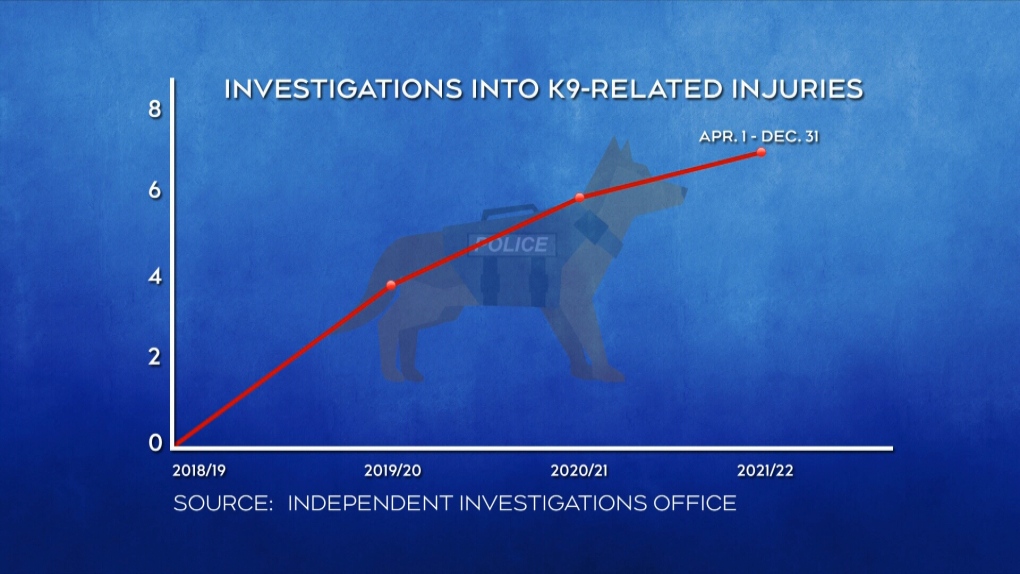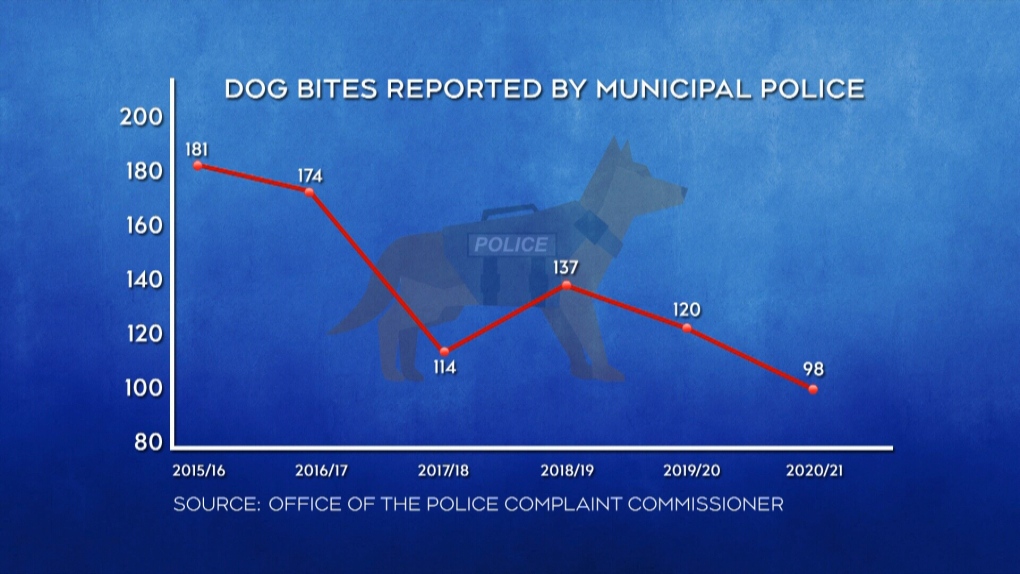B.C. police dog bites under scrutiny by advocates, oversight agencies
Stakeholders are sharing their expertise on the use of police dogs in B.C., weighing the benefits they offer police with the injuries they can inflict.
From tearing arteries to pulling people’s ears from their scalps, police dogs can inflict brutal damage, according to advocates.
"We’re talking about permanent damage to people’s limbs, nerve damage, muscle injuries," said Meenakshi Mannoe, policing campaigner for Pivot Legal Society.
"And then of course, emotional scars and trauma… from a very disturbing use of force," she said.
Mannoe works with the family of Jared Lowndes, a Wet'suwet'en man shot and killed by Campbell River RCMP in July. Officers boxed in his vehicle and deployed a police service dog, which RCMP said he stabbed fatally.
"I have been, and continue to be, against the use of dogs to inflict pain and punishment on people," Lowndes’ mother, Laura Holland, wrote in an email to CTV News.
Mannoe said B.C. needs stricter standards to protect people from getting hurt.
"[Dog bites] should be considered just below a lethal use of force and that should dictate how and when they’re involved in policing," she said.
K9s ARE MULTI-PURPOSE, POLICE SAY
Police dogs aren’t used as a punitive measure, said Sgt. Calvin Ewer, who heads the Integrated Canine Service in Victoria and Saanich.
"Make no mistake about it, this is a minimal force concept. We don’t want to bite these subjects," Ewer told CTV News.
"[Dog handlers] go through that checklist: Is the public at risk? Are the police at risk? Is the subject at risk?"
He said dogs are a key resource for protecting the public and police and for supporting officers on the front lines.
"We could be tracking a violent suspect from a robbery… in the morning and in the afternoon we could be searching for a missing dementia patient," he said.
Criminal defence lawyer Sarah Leamon said she’s seen "shocking" injuries caused by K9s.
"It’s important to always consider how we could do it better," Leamon said.
"[But] I don’t think that just because there are complaints or lawsuits that involve the use of police dogs that police dogs should be retired altogether."
HUNDREDS OF BITES EACH YEAR
Victoria and Saanich’s Integrated Canine Service dogs were deployed 399 times in 2021, for calls from bomb sweeps to evidence searches. They were key contributors in the arrests of 86 people, biting 12 of them, Ewer said.
Province-wide, hundreds of bites are recorded each year. B.C. RCMP and its Lower Mainland Integrated Police Dog Services reported 193 bites in 2019. That same year, Vancouver police recorded 109 bites, according to the most recent data reported to B.C.’s police services director.
From April to the end of December, the Independent Investigations Office (IIO) has investigated seven serious injuries linked to K9s, up from zero in 2018/19.
 The IIO says investigations involving serious injuries linked to police service dogs are on the rise. (CTV News)
The IIO says investigations involving serious injuries linked to police service dogs are on the rise. (CTV News)
"The number of cases that are being reported to us and the number of cases that have resulted in serious harm are increasing quite substantially," said IIO chief civilian director Ron MacDonald.
More analysis is needed to determine why those numbers are on the rise, he said.
"Generally, we find that the use of force is warranted. Most often… it’s circumstances where the individual was presenting a risk of bodily harm," he said.
At the Office of the Police Complaint Commissioner (OPCC), bites are trending in the opposite direction.
In 2020/21, municipal police reported 98 bites that required emergency care, down from 181 in 2015/16.
Generally, the OPCC records more injuries from dog bites than any other type of force, so the deputy police complaint commissioner said this is a good sign.
"At the OPCC, we’re looking to be able to take a deeper dive into those statistics … to determine [if there are] any broader trends," Andrea Spindler said.
 Municipal police are required to report to the OPCC all injuries where someone requires emergency care and transfer to hospital. (CTV News)
Municipal police are required to report to the OPCC all injuries where someone requires emergency care and transfer to hospital. (CTV News)
Complainants have flagged concerns that they already surrendered or there wasn’t ample warning before a dog was deployed, she said.
"Because it is a valuable tool for police to use, it’s not something that we’re looking to take away, but really making sure that it’s an accountable tool," Spindler said.
MORE STRINGENT STANDARDS?
MacDonald said B.C. has some of the strongest policing standards in Canada. Still, he plans to recommend tweaks to the province’s police services director, former Mountie Wayne Rideout.
The Public Safety Ministry declined CTV’s request to interview Rideout.
The policing standards say K9s can bite when someone is at risk of bodily harm or if a person of interest is fleeing or hiding.
"If the person is escaping from an offence that doesn’t pose a risk of harm to anybody, I think police service dogs should not be used to apprehend," MacDonald said. "That advice needs to be more specific."
The standards say handlers must have reasonable grounds to deploy their dog, considering the seriousness of an offence.
Pivot Legal Society is also calling for mandatory tracking of race-based data, to determine whether racialized people are disproportionately bitten by police dogs.
Mannoe also wants the province to fund legal and advocacy support for people injured by police dogs.
"I don’t see any commitment from the provincial government around minimizing or eliminating injuries that result from police service dogs," she said.
CTVNews.ca Top Stories

DEVELOPING Live updates as Stormy Daniels testifies at Trump hush money trial
Adult film star Stormy Daniels will take the stand a second time Thursday as former U.S. president Donald Trump’s hush money case continues in Manhattan. Follow live updates here.
NEW From yearning for a change to cost of living, why some Canadians have left or may leave the country
For some immigrants, their dreams of permanently settling in Canada have taken an unexpected twist.
Here are the ultraprocessed foods you most need to avoid, according to a 30-year study
Studies have shown that ultraprocessed foods can have a detrimental impact on health. But 30 years of research show they don’t all have the same impact.
NEW Capital gains tax change 'shortsighted' and 'sows division' business groups tell Freeland
Forging ahead with increasing Canada's capital gains inclusion rate 'sows division,' and is a 'shortsighted' way to improve the deficit, business groups are warning Finance Minister Chrystia Freeland.
Ontario man frustrated after $3,500 paving job leaves driveway in shambles
An Ontario man considering having his driveway paved received a quote from a company for $7,000, but then, another paver in the neighbourhood knocked on his door and offered half that rate.
Defence attacks Stormy Daniels' credibility as she returns to the stand in Trump's hush money trial
Stormy Daniels will return to the witness stand Thursday in Donald Trump's hush money trial as the defence tries to undermine the credibility of the porn actor's salacious testimony about their alleged sexual encounter and the money she was paid to keep quiet.
With contactless screening tech, this Toronto startup hopes to catch breast cancer early — and save lives
Amid evidence of rising breast cancer rates among young women in Canada, one Toronto startup is offering a contactless and radiation-free device that can help doctors identify suspicious changes in breast tissue. The company, Linda Lifetech, says this can lead to earlier detection of breast cancer.
Tornadoes tear through southeastern U.S. as storms leave 3 dead
Forecasters warned a wave of dangerous storms in the U.S. could wash over parts of the South early Thursday, a day after severe weather with damaging tornadoes and large hail killed at least three people in the region.
Police handcuff man trying to enter Drake's Toronto mansion
Toronto police say a man was taken into custody outside Drake's Bridle Path mansion Wednesday afternoon after he tried to gain access to the residence.































